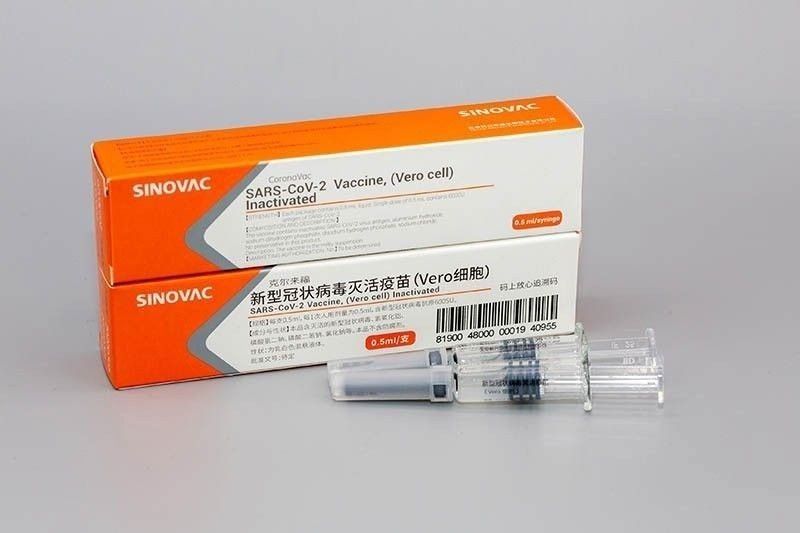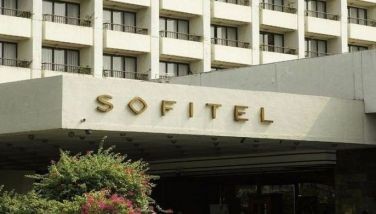Duterte vouches for Sinovac, lets LGUs get any vaccine

MANILA, Philippines — President Duterte yesterday vouched for the efficacy of Chinese-made vaccines, but said local government units (LGUs) are free to negotiate for their preferred shots as long as these have drug regulatory approval.
He also welcomed efforts by private businesses not only to procure their own vaccines for their employees, but also in assisting the government in the cold chain logistics requirements for transporting vaccines.
“If they can buy outside government structures, eh di mas maganda,” Duterte said.
Duterte said he was taking full responsibility for the safety and efficacy of the vaccine to be administered by the national government, as he maintained that Chinese-made vaccines are just as good as the Western jabs.
“We are not forcing anybody to join the cause of the national government,” Duterte said last night as he addressed concerns of LGU officials. “Kung ayaw ninyo, OK lang, walang problema (If you don’t like it, it’s OK, no problem). You can choose any vaccine you like to buy. Wala kaming pakialam kung ano ang pipiliin nyo. Hindi kami makialam (We don’t care which vaccine you want to buy. We won’t interefere).”
Duterte issued the statement as Chinese drugmaker Sinovac is expected to be granted its emergency use authorization (EUA) for its vaccine before Feb. 20, vaccine czar Carlito Galvez Jr. said yesterday.
“Fifty thousand doses of Sinovac in February, then 950,000 in March, then one million, two million, three million every month (after that),” Galvez said, referring to the schedule of deliveries.
He said the firm still needs to finish its clinical trials in Turkey and Brazil, whose results would be submitted to the Food and Drug Administration.
China has also yet to clear the firm for export and general use, which Galvez said could be out by the first week of February.
“By the first week of February, China will issue an EUA to Sinovac for general use and for export because their current EUA is for limited use, which they got in August last year,” he said.
While researchers bared that Sinovac’s vaccine was just 50.4 percent effective in a Brazilian trial, Galvez defended the government’s decision to secure vaccines from the Chinese drugmaker, saying it had given the Philippines the “best price” compared to US pharmaceutical firms.
Health Secretary Francisco Duque III reported to Duterte that businessmen were assisting the government in setting up the cold chain facilities needed for the vaccines. Among them are PLDT chairman Manuel V. Pangilinan, whose group owns a chain of hospitals, as well as the Ayalas and Go Negosyo founder Joey Concepcion whose family is engaged in manufacturing of food and electronics.
“We will remember you,” Duterte said.
Deal with AstraZeneca
Meanwhile, the Philippines will sign today a deal with British drugmaker AstraZeneca for the procurement of about 20 million doses of COVID vaccines, Galvez bared.
He also announced that conclusive final agreements with other pharmaceutical firms are expected to be signed in the next few days.
“Tomorrow, we will sign the tripartite agreement of more or less 20 million doses for AstraZeneca,” he said in a televised press briefing yesterday.
A tripartite deal among the national government, a vaccine maker and local government units or private firms allows the latter to secure their own supplies of COVID vaccines.
Galvez said after the signing today, a tripartite supply deal would be signed with local government units (LGUs) tasked to administer the vaccines to their constituents.
“The supply chain requirement, syringe, consumables – the efforts of LGUs, national government and private sector are integrated. If one LGU can only buy 30 percent (of the vaccine supply using their budget), the national government will supplement the remaining 70 percent,” he said.
The deal expected to be signed with AstraZeneca would be in addition to an agreement last year between the government and the private sector for 2.6 million doses.
A second order was also placed earlier for an additional 3.7 million to 3.8 million doses.
The British drugmaker said its vaccine could be around 90 percent effective, is cheaper, easier to distribute and faster to scale up compared to its rivals.
The government aims to vaccinate 50 million to 70 million Filipinos against COVID-19 this year as it looks forward to close deals this month with several drugmakers including Novovax, AstraZeneca, Pfizer, Johnson & Johnson, Sinovac and Gamaleya.
Galvez said conclusive final agreements with these pharmaceutical firms are expected to be signed in the next few days, which will provide the country more or less 148 million doses.
He said COVID vaccines from Pfizer-BioNTech, Sinovac and AstraZeneca would be available for the Philippines before June this year.
“All our negotiations, including those with Moderna, Pfizer and other brands like Johnson & Johnson, have yielded good results. We now have what you call conclusive final agreements that we can sign any day now,” Galvez said.
The country has also secured 30 million doses of Novavax’s vaccine Covovax, which will be manufactured by the Serum Institute of India and 25 million from Sinovac.
The Philippine FDA is currently evaluating EUA applications for vaccines developed by AstraZeneca, Pfizer and the Russian Gamaleya Research Institute.
Vaccine negotiations
The Philippine embassy in Washington said the government is in the final stage of negotiating with American biotechnology company Moderna for the supply of a minimum of 10 million doses of COVID vaccine, which will be delivered beginning middle of this year.
Ambassador Jose Manuel Romualdez welcomed the pledge of support of the private sector led by International Container Terminal Services Inc. chairman and president Enrique Razon in shipping and distributing the vaccines from the manufacturing facility in Spain to the Philippines at no cost to the government.
Foreign Affairs Secretary Teodoro Locsin Jr. said last month that Moderna was “on board” and “accelerating” huge shipment of COVID-19 vaccine to the Philippines.
Romualdez said the Philippines is not yet ready to handle millions of COVID-19 vaccine doses by this month as it takes a lot of logistical work.
The Pfizer vaccines will be stored in an ultra-cold freezer, thermal shipping container or refrigerator. Cold storage is crucial to COVID-19 vaccine distribution.
The vaccine developed by Moderna, Romualdez said, does not require that kind of refrigeration.
DOH allays fears
The Department of Health (DOH) and medical experts allayed fears brought about by the reported possible side effects of Chinese vaccines as the government starts to roll out the first batch by next month.
Lulu Bravo, president of the Philippine Foundation for Vaccination, said the DOH has placed proper mechanisms to ensure that the after-effects of the vaccines, regardless of brand, would be properly monitored, specially in the most vulnerable population.
“The one we refer to as an adverse event following immunization, that’s been in place at the DOH since 2013. I can tell you that because I am one of those who founded the NAEFIC or National Adverse Event Following Immunization Committee, and we are able to monitor the side effects of vaccines,” Bravco said at a press briefing.
With the coronavirus pandemic, Bravo said it is understandable that the public is curious about the efficacy and side effects of the vaccines developed to fight this virus.
The National Adverse Event Committee is composed of experts including pediatricians, neurologists and specialists in various medical fields.
Meanwhile, Health Undersecretary Maria Rosario Vergeire expressed confidence that the NAEFIC will be able to deal with issues that may arise from the implementation of the vaccination against COVID-19.
“They are the ones who review and provide the final totality assessment if the adverse reactions are really caused by the vaccine itself and also, they will be providing recommendations if there would be serious and clusters of reactions on the vaccines,” she said.
Apart from the government agencies, Vergeire said the medical experts in these fields are also being consulted by the government.
“But definitely, the experts’ recommendations are considered and these become the basis of our government for the implementation of the national vaccination program,” she added. – Neil Jayson Servallos, Pia Lee-Brago
- Latest
- Trending


























